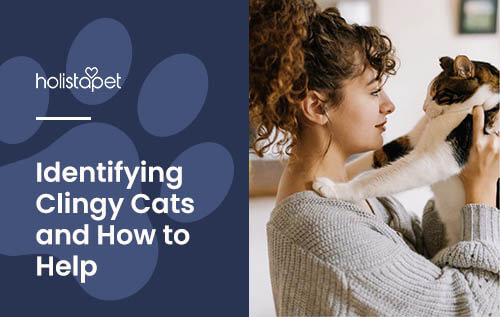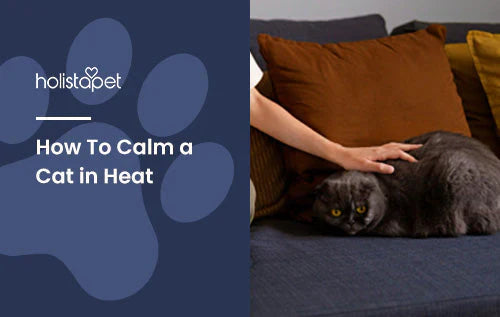Have you ever wondered, "Why is my cat so clingy?" You're not alone. Lots of cat parents get puzzled by their feline friends' sudden neediness. We know cats to be naturally independent. But sometimes, they can show clingy behavior and leave their pet parents stumped.
If you understand your cat's behavior and why they become extremely clingy, you can meet their needs and support their overall health and well-being. There are many valid reasons for overly clingy cat behavior, such as changes at home, underlying health conditions, or simply a cat's personality.
In this article, we'll look into the common causes of clinginess in cats. Plus, we'll discuss some helpful tips to help you live in perfect harmony with your furry friend. Let's begin!
Are Cats Normally Clingy Creatures?

Cats generally like to do their own thing, but this isn't always the case. While many cats like solitude, needy cats do exist. Maybe you've encountered one: a velcro cat that demands cuddles and follows you around the house like a shadow.
So, a needy cat is not an anomaly. A kitty might start seeking attention and demanding affection for different reasons. A cat's clinginess can depend on their personality, experiences, early socialization, breed, and more. Understanding these factors can help cat owners better deal with their four-legged friends' needs.
Are Some Cat Breeds More Clingy?
Not all cats are the same, and some breeds may be more clingy than others. Mastering your cat's breed can help you better manage their demanding behavior.
Do you have a Siamese, Ragdoll, or Sphynx? These cats are naturally more affectionate and social. They love to interact and can become very attached to their humans.
For example, Siamese cats are super vocal (think excessive meowing) and love to follow their humans around. Ragdolls are more laid-back, but they do enjoy lots of cuddles. Lastly, Sphynx cats crave warmth and physical touch because they lack fur.
Common Signs of Clingy Cats
Clingy cats can show you they need attention in all sorts of ways. As a pet parent, it is up to you to recognize these signs and fulfill your cat's emotional needs. Feline clinginess can show up as:
- Following you around the house constantly
- Excessive meowing when you're out of sight
- Demanding to sit on your lap or next to you at all times
- Acting worried when left alone or when you leave the room
- Wanting physical contact, such as rubbing against you or sleeping on your bed
Why Do Cats Become Clingy?
Why is your cat suddenly clingy? Cats can be mysterious creatures, but one thing's for sure: They don't act needy for no reason. These things might be making your feline friend overly clingy:
- Home Environment Changes. Did you bring home a new pet or family member, move to a new place, or rearrange the furniture? Changes can make your kitty feel nervous, so they might stick close to you for comfort.
- Underlying Medical Condition. Sometimes, a cat's clinginess can point to health issues. Don't forget to go on regular vet check-ups to catch any underlying health problems.
- Previous Trauma Experiences. Trauma, negative reinforcement, and neglect can take their toll on our feline companions. A loving and predictable home environment can help them feel better.
- Physical or Emotional Stress. Changes in routine or loud noises can worry your cat and make them turn to you for reassurance. Create a calm and quiet space for them to relax.
- Separation Anxiety. Some cats develop separation anxiety if they're left alone for long periods. If you think this might be the case, try gradually increasing the amount of time your kitty spends on their own.
- Your Cat Is Hungry. Let's be honest — sometimes, a clingy cat just means a hungry cat. Maintain a regular feeding schedule to keep your kitty happy and well-fed.
- Bored Behavior. Cats that lack mental stimulation and physical activity can show attention-seeking behavior and even destructive behavior (think scratching furniture and knocking things over). Give them interactive toys and schedule regular playtime sessions to reduce unwanted behavior.
How To Deal with Clingy Felines
With a little understanding and some simple steps, you can develop a better dynamic with your overly affectionate cat. Remember these tips:
- First, Understand Your Cat's Clingy Behavior. Watch your cat's behavior closely. Are they clingy all the time, or just after you get home? This can give you clues.
- Spend More Quality Time Together. Cats love attention but on their own terms. Dedicate some quality time each day to playing, petting, or just hanging out with your cat. This will strengthen your bond further.
- Provide Exercise and Playful Activities. Cats get bored, too. Make sure your kitty gets enough mental and physical stimulation. A fun cat tree, some interactive toys, puzzle feeders, and regular playtime sessions can keep them entertained and less likely to be clingy.
- Try Calming & Comforting CBD Cat Options. Talk to your vet about CBD options for your cat. CBD (cannabidiol) does wonders in calming and comforting our feline friends. At HolistaPet, we offer a line of bestselling CBD products for cats, tried and tested by many satisfied pet parents. We've got CBD hard treats, calming soft treats, oils, and capsules you can choose from.
- Feed Them on a Regular Schedule. A rumbling tummy can make a kitty clingy. Set a consistent feeding schedule for your cat and make sure they always have fresh water available.
- Provide a Safe Space and Environment. Cats need a safe space to retreat to when they feel overwhelmed. Provide your cat with a quiet area with hiding places and scratching posts so they can feel more secure.
- Get a Second Cat. Two cats are better than one. If you think your cat might be lonely, consider getting another one. Just be sure to introduce them properly to avoid territorial issues.
Can Clingy Behavior Require Professional Help?

Sometimes, even the best quality time can't quite tame your cat's clinginess, and you may need to call in an expert. Aside from neediness, there are other signs you can watch out for to decide if it's time to visit a professional.
For example, if your pet's clinginess is already disrupting their (or your) routine, it could point to a serious medical issue. Your vet can check for health problems like thyroid issues or discomfort.
Animal behaviorists can also help. They can identify environmental factors or past traumas that might be making your cat so needy. They can also develop a personalized plan to help your kitty recover from unpleasant experiences and become more independent.
Why Is My Cat So Clingy - Frequently Asked Questions
So, now you know the possible reasons for your cat's clinginess. You also have more ideas on how you can manage their behavior. You're almost done with your crash course on clingy cat behavior. We just have a few more FAQs to answer so you can arm yourself with even more info. Let's get into some commonly asked questions about clingy cats.
Do Cats Have Emotional Needs?
Yes, of course, cats have emotional needs. Even though they're very independent, cats still need love, attention, and interaction to thrive. They usually communicate their emotional needs by seeking affection, vocalizing, and engaging in play.
As a caring pet parent, you must acknowledge these signs and address your cat's needs. Doing so can help you form a strong, trusting bond with them.
What Is the Most Clingy Cat Breed?
The Siamese cat has a reputation for being a very clingy breed. Siamese cats are very vocal and social by nature. They thrive on human interaction and can become extremely attached to their owners.
The Ragdoll and the Sphynx are close runners-up. Ragdolls are gentle and love cuddles. Sphynx cats also love physical closeness and crave warmth since they don't have fur.
These are just general observations. Remember that a cat's personality plays a big role, too. Any cat can be clingy regardless of their breed.
How Do You Tell if Your Cat Is Too Attached?
You may sometimes wonder if your cat is too clingy or if their behavior is still normal. Watch them closely and make your best judgment.
If your cat follows you everywhere (including to the bathroom) and becomes upset when you're out of sight, they might be experiencing separation anxiety. They may vocalize loudly and persistently whenever you're gone.
Is your cat always sitting on your lap or sleeping on you, and you're unable to do anything else? This constant demand for physical contact is another sign. Destructive behavior, like scratching furniture or knocking things over, can also be a desperate cry for attention.
Related Post: Signs Of Anxiety In Cats
Is It Bad if a Cat Is Super Clingy?
A super clingy cat isn't necessarily bad, but it might indicate more serious issues. As we've discussed, excessive clinginess can stem from various stressors, boredom, or health problems. You need to consider these possible causes.
If your cat's clinginess persists, consult a vet or a cat behaviorist for solutions. Solving the root cause can support your pet's health and wellness.
The Bottom Line - Why Is My Cat So Clingy?
Knowing the reason behind your cat's clinginess is a great step toward providing them the best care. When you recognize the signs and take the right steps, your feline friend will feel seen and loved. You can count on our range of calming CBD products for cats for more support. Armed with the right tools and knowledge, you're now ready to keep your kitty relaxed and happy for years to come.


 CBD Oil for Cats - Fast Acting
CBD Oil for Cats - Fast Acting
 CBD Cat Treats - Easy Dose
CBD Cat Treats - Easy Dose
 CBD Calming Chews for Cats - Highly Rated
CBD Calming Chews for Cats - Highly Rated
 CBG Oil for Dogs and Cats - Loved by Thousands
CBG Oil for Dogs and Cats - Loved by Thousands





Leave a comment
All comments are moderated before being published.
This site is protected by hCaptcha and the hCaptcha Privacy Policy and Terms of Service apply.